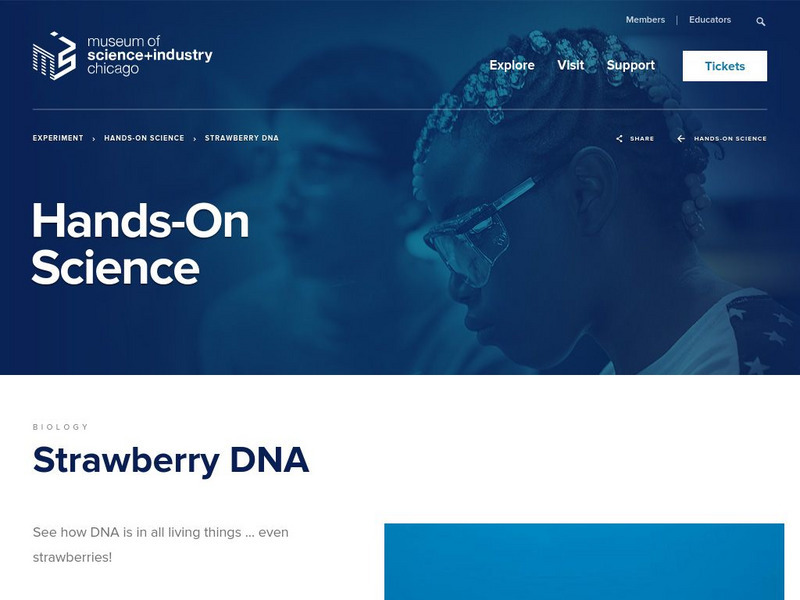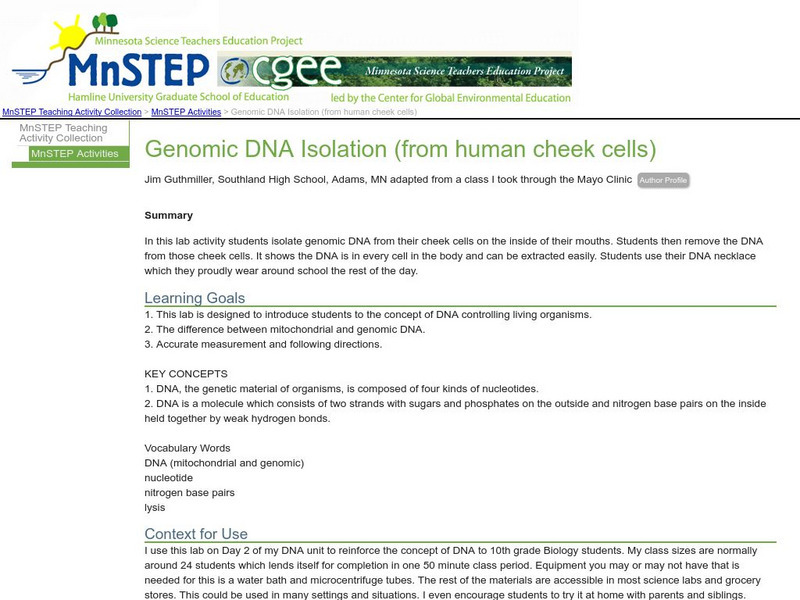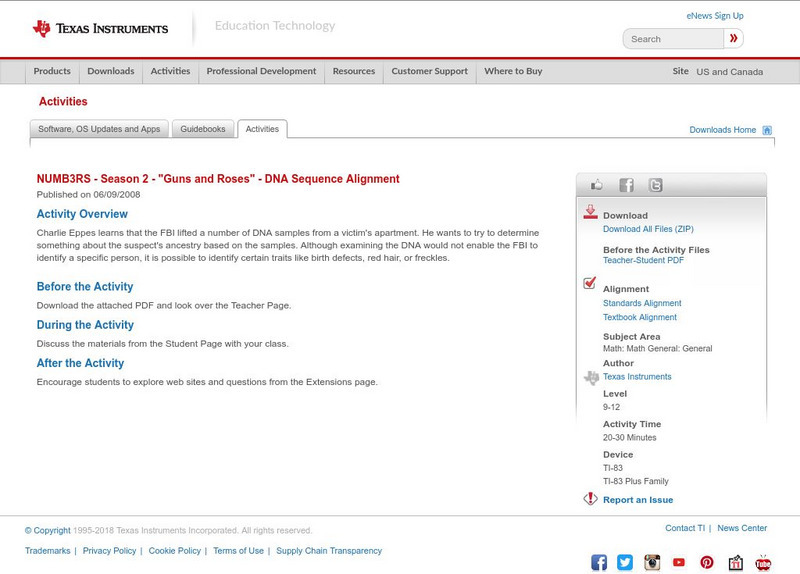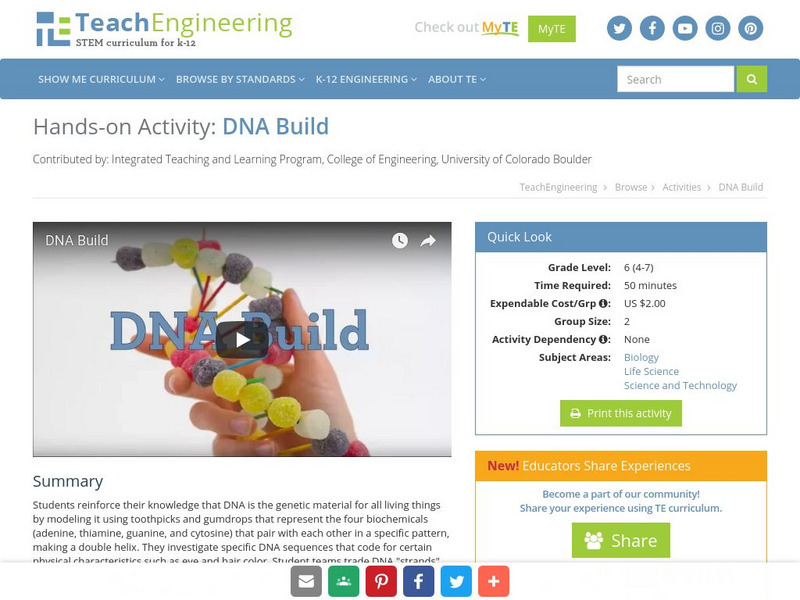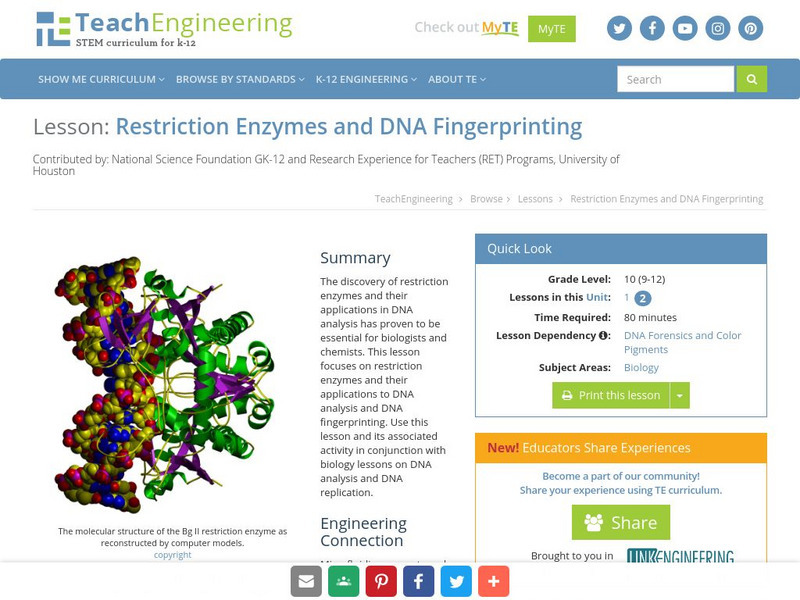Genome British Columbia
Genome British Columbia: Dna Code Bracelet
For this activity, students create a bracelet of beads using DNA code. Each letter represents an amino acid and is three beads. The authors suggest that even younger students would enjoy this activity, although older students will...
Genome British Columbia
Genome British Columbia: Dna Extraction Experiment
This experiment uses simple, easy to obtain ingredients. It involves extracting DNA from fruit. It is recommended for grades 8 and up but is good for demonstration purposes with younger students.
University of Utah
University of Utah: Genetic Science Learning Center: Dna and Verdicts
Part of a site on genetics, this page explores DNA as a forensic science. Explains how and why DNA can be used to convict or acquit a criminal from wrongdoing using forensic DNA analysis. Teacher resources too.
Genome British Columbia
Genome British Columbia: Edible Dna [Pdf]
Students use food (licorice and marshmallows or fruit) to make models of DNA.
PBS
Pbs Learning Media: Dna Structure and Function: Decoding Watson
Discover how the structure of DNA relates to its hereditary function in these videos from the American Masters film Decoding Watson. The first video, "DNA Structure and Function," [2:07] can be used with all middle and high school...
Carnegie Mellon University
Chem Collective: Dna Binding Dyes Scenario
This activity explores the equilibrium of dyes that self-assemble into DNA templates. Students use knowledge of equilibrium and quantitative spectroscopy to explore different dyes that bind selectively to DNA molecules. In this activity,...
Chemistry Collective
Chem Collective: Determining Reactants and Products in a Solution of Dna
In this limiting reagents problem, students are given specific concentrations of DNA solutions and are asked to predict what products and reactants will remain after a specific volumes are mixed and reaction has occurred.
University of Arizona
University of Arizona/dna Structure Activity
Activity based on the use of computer enhanced molecular images, might be worth the effort for an AP class to try.
Museum of Science
Museum of Science and Industry: Online Science: Activities: Extract Dna
An experiment where students remove DNA from strawberries using everyday materials.
Other
Beautiful Chemistry: Beautiful Structures: Dna Nanostructures
DNA is the molecule of life, as life's secrets are encoded in DNA. In this interactive activity. we see the famous double helix structure of DNA.
Science Education Resource Center at Carleton College
Serc: Genomic Dna Isolation: From Human Cheek Cells
In this lab activity learners isolate genomic DNA from their own cheek cells. They then remove the DNA from those cheek cells through a laboratory process.
Texas Instruments
Texas Instruments: Numb3 Rs: Dna Sequencing Alignment
Based off of the hit television show NUMB3RS, this lesson has student find the level of similarity between two different-length strands of DNA. Connections to Djikstra's algorithm are mentioned, and students learn more to follow careful...
TeachEngineering
Teach Engineering: Dna Build
Students reinforce their knowledge that DNA is the genetic material for all living things by modeling it using toothpicks and gumdrops that represent the four biochemicals (adenine, thiamine, guanine, and cytosine) that pair with each...
TeachEngineering
Teach Engineering: Dna Forensics and Color Pigments
Students perform DNA forensics using food coloring to enhance their understanding of DNA fingerprinting, restriction enzymes, genotyping and DNA gel electrophoresis. They place small drops of different food coloring ("water-based paint")...
National Health Museum
Access Excellence: Dna Sequencing (Dry Lab Activity)
This site is an advanced level hands-on activity to explain the Di-deoxy sequencing of DNA.
National Health Museum
Access Excellence: Genes, Dna, and Mutations
A good Access Excellence site with an introduction to the processes of transcription and translation, leading to a student modeling activity.
National Health Museum
Access Excellence: Structure of the Dna Molecule
Read a history of the discovery and study of DNA and its structure. Links to a graphic, other references, and classroom activities.
Huntington Library
Huntington Library:garden Lesson Plans: Fruit Salad Hold the Dna, Please [Pdf]
After learning about DNA and how it is used in crime scene analysis, learners take part in a lab activity where they extract DNA from ripened fruit.
National Health Museum
Access Excellence: Dna Detectives
A hands-on activity from Access Excellence for advanced biology classes. Students are given a crime scenario and three suspects. Their mission is to determine 'Who Dunnit?' by obtaining and analyzing DNA samples. Requires extensive...
American Museum of Natural History
American Museum of Natural History: O Logy: Stuff to Do: Dna in a Blender
Follow these illustrated instructions to conduct a simple experiment in separating DNA from an onion!
Cold Spring Harbor Laboratory
Dna From the Beginning: Different Cells Different Genes
Many scientists have worked on discovering what genes are "turned on" within cells at different stages of development. DNA arrays and gene chips are techniques that have been developed. This article will help you understand these...
CK-12 Foundation
Ck 12: Dna Structure and Replication
[Free Registration/Login may be required to access all resource tools.] Module describes how DNA's structure and function was discovered while summarizing the process of DNA replication. This activity also explains Chargaff's rules and...
TeachEngineering
Teach Engineering: Restriction Enzymes and Dna Fingerprinting
The discovery of restriction enzymes and their applications in DNA analysis has proven to be essential for biologists and chemists. This instructional activity focuses on restriction enzymes and their applications to DNA analysis and DNA...
TeachEngineering
Teach Engineering: Imaging Dna Structure
Students are introduced to the latest imaging methods used to visualize molecular structures and the method of electrophoresis that is used to identify and compare genetic code (DNA). Students should already have basic knowledge of...
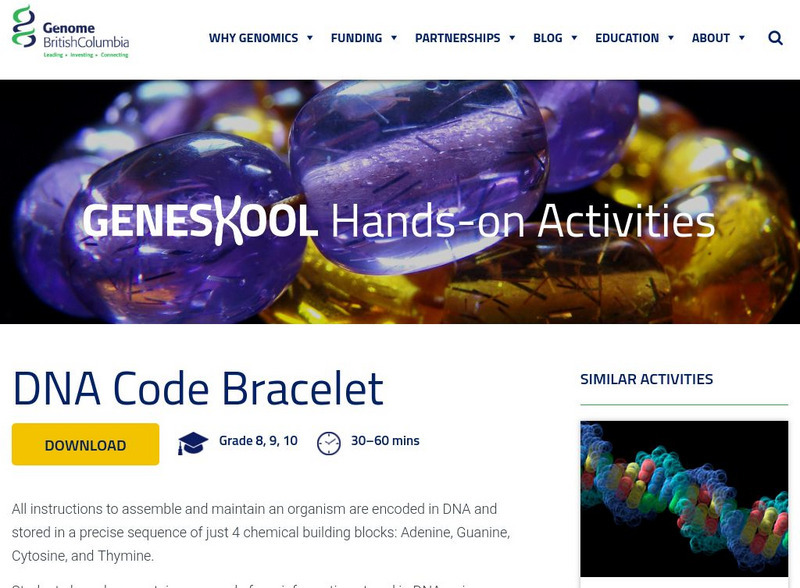

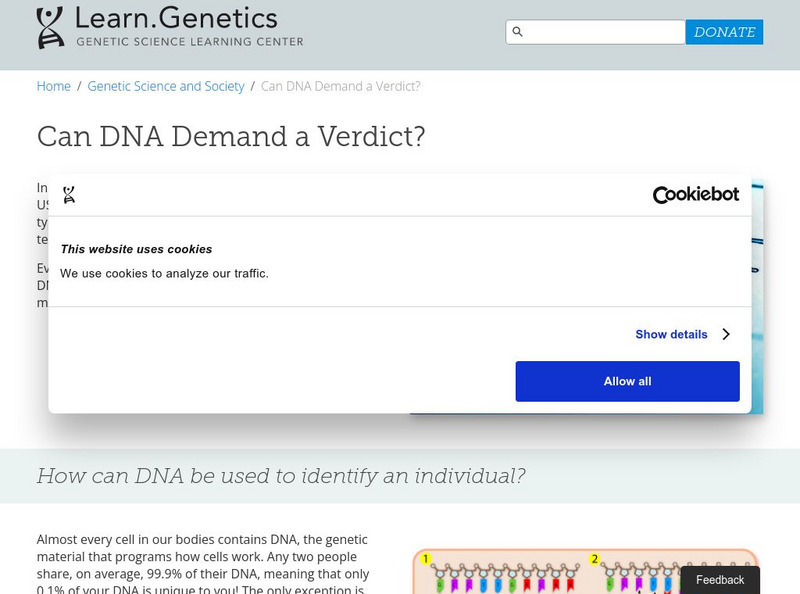
![Genome British Columbia: Edible Dna [Pdf] Activity Genome British Columbia: Edible Dna [Pdf] Activity](https://d15y2dacu3jp90.cloudfront.net/images/attachment_defaults/resource/large/FPO-knovation.png)



